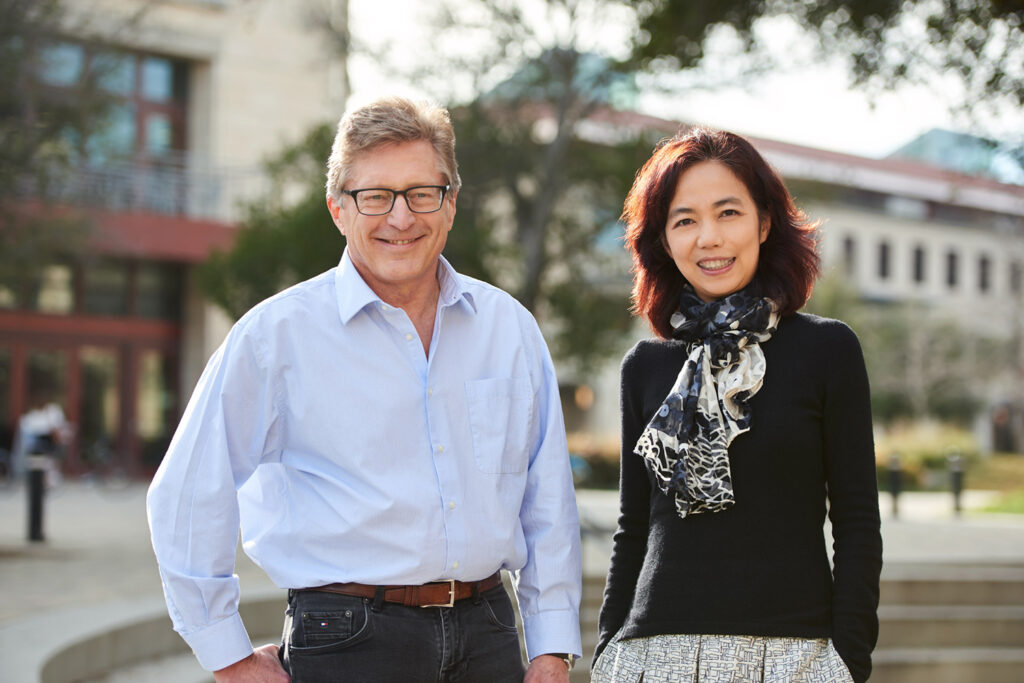‘Big steps ahead’ for Stanford HAI
In just five years, the institute has made major strides engaging policy, industry, and civil society to ensure that AI is developed with humans at the center.

John Etchemendy and Fei-Fei Li, founding co-directors of the Stanford Institute for Human-Centered Artificial Intelligence. (Image credit: Drew Kelly for Stanford Institute for Human-Centered Artificial Intelligence)
During her sabbatical at Google as Cloud AI chief scientist, Fei-Fei Li witnessed the rapid integration of artificial intelligence into industry: From Japanese cucumber farmers to insurance firms and energy conglomerates, AI was reshaping traditional practices.
Recognizing the profound impact of AI, Li envisioned a future where technology serves humanity with fairness and dignity. With Stanford’s rich history in AI research and its leadership in both technology and humanities, she knew she could spearhead a new effort here.
Now entering its fifth year, the Stanford Institute for Human-Centered Artificial Intelligence (HAI) has made significant strides toward Li’s ambitious vision. By fostering a diverse interdisciplinary research community, channeling substantial funding into AI research, establishing specialized centers, and collaborating with policymakers and industry leaders, HAI has positioned itself as a trailblazer in shaping the ethical and inclusive development of AI.
“HAI was the first institution in the public sector that was set up devoted not only to the innovation of this cutting-edge technology, but also to engaging policy, industry, and civil society to ensure this technology is developed with humans at the center,” Li said.
”We’ve taken major strides in policy and thought leadership,” said co-director John Etchemendy, former provost and one of HAI’s original founders (along with Li and Stanford School of Engineering professors James Landay and Chris Manning), “and we have big steps ahead.”
Highlights from HAI’s first five years:
- Stanford HAI has funneled more than $40 million into human-centered AI research, supporting over 300 Stanford scholars across disciplines.
- The institute prioritized building a multidisciplinary education community. Initiatives such as a human-centered AI track in the Symbolic Systems major, student affinity groups, a graduate fellows program, and tech and policy fellowships aim to nurture the next generation of AI leaders.
- Recognizing emerging trends in AI, HAI swiftly launched two new centers: The Stanford Digital Economy Lab (DEL) and the Center for Research on Foundation Models (CRFM).
- Stanford HAI led the call to democratize AI research through a national AI research resource; leaders organized universities and tech companies to support this endeavor in 2020, wrote a blueprint for a resource in 2021, and served on key task forces.
- Recognizing the need for collaboration between academia and industry, Stanford HAI created its industry affiliate program that has since established 50+ technology collaborations between Stanford and company researchers and delivered $10 million in research grants and $9 million in cloud computing credits to Stanford.
In just five years, HAI has made significant impacts in policy, research, and education. However, the future of AI scholarship may transcend the confines of Stanford University.
“The science has outgrown the university model of research,” Etchemendy, the Patrick Suppes Family Professor in the School of Humanities and Sciences, remarked. As AI models become larger and more complex, scholars need to seek resources beyond traditional university settings to remain at the forefront of the field.
He drew parallels with high-energy physics. Just as universities partner with governmental organizations to build large-scale research facilities, such as linear accelerators, to accommodate the evolving needs of particle physics, a similar approach is warranted in AI research.
“These large foundation models have outgrown what universities can do,” Etchemendy said. While industry has intervened, its focus on commercial applications often fails to prioritize broader knowledge dissemination.
In response, HAI leaders advocate for a novel approach – a collaborative lab environment funded by philanthropy and government support. Such a setting would not only provide cutting-edge training opportunities for students but also enable scholars to delve deeper into research on these massive AI models.
“This is our next step,” Etchemendy said. “By embracing this new element, we can continue our mission to advance AI research for the betterment of society.”
Stanford HAI was founded by Sequoia Capital Professor Fei-Fei Li; Anand Rajaraman and Venky Harinarayan Professor James Landay; Thomas M. Siebel Professor of Machine Learning, Professor of Linguistics and of Computer Science Chris Manning; and Patrick Suppes Family Professor in the School of Humanities and Sciences John Etchemendy.